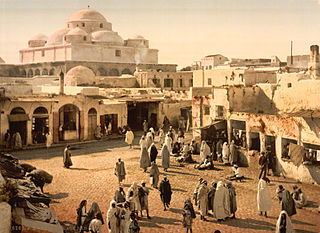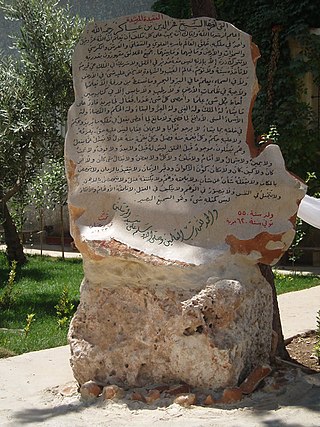
Abū al-ʻAbbās Ahmad ibn Muhammad at-Tijāniyy or Ahmed Tijani, was an Algerian Sharif who founded the Tijaniyyah tariqa.
Al-Ḥabāb ibn al-Mundhir ibn Zayd was one of the prominent Sahaba and Ansar from the Khazraj tribe.
"O the Messenger of Allah, has Allah inspired you to choose this very spot, so we cannot go onward or backward? Or is it the stratagem of war and the product of consultation?" The Prophet replied, "it is the stratagem of war and the product of consultation." Al-Habab said: "This place is no good, let us go and encamp on the nearest water to seize the water-supply, and build a basin full of water, then destroy all the other wells, then we fight the people, so that they will be deprived of the water." The Prophet said: "You have given the exact advice." The Prophet approved of his plan and agreed to carry it out.".
Al-Aqidah Al-Waasitiyyah is a book of Islamic creed written by the Hanbali jurist Taqi al-Din ibn Taymiyyah in the year 1297 CE. It is considered relatively easy to understand compared to Ibn Taymiyyah's other works on creed. Ibn Taymiyyah explained his purpose for writing it as follows:

Abū al-Farash ʿAbd al-Raḥmān ibn ʿAlī ibn Muḥammad ibn al-Jawzī, often referred to as Ibn al-Jawzī for short, was a Muslim jurisconsult, preacher, orator, heresiographer, traditionist, historian, judge, hagiographer, and philologist who played an instrumental role in propagating the Hanbali school of orthodox Sunni jurisprudence in his native Baghdad during the twelfth-century. During "a life of great intellectual, religious and political activity," Ibn al-Jawzi came to be widely admired by his fellow Hanbalis for the tireless role he played in ensuring that that particular school – historically, the smallest of the four principal Sunni schools of law – enjoy the same level of "prestige" often bestowed by rulers on the Maliki, Shafi'i, and Hanafi rites.
Abdul-Rahman al-Tha'alibi was an Arab Scholar, Imam and Sufi wali. He was born near the town of Isser 86 km south east of Algiers. He was raised in a very spiritual environment with high Islamic values and ethics. He had great interpersonal skills and devoted his entire life in service of the most deprived, to dhikr of Allah, and to writing of over 100 books and treatises.

Sidi Mahrez ben Khalaf or Abu Mohamed Mahrez ben Khalaf ben Zayn was a Tunisian Wali, scholar of the Maliki school of jurisprudence and a Qadi. He is considered to be the patron-saint of the city of Tunis.
Hadith al-Silsilah al-Dhahab is a hadith narrated from Ali al-Ridha, the eighth Imam of the Shia. The "chain" is a reference to the continuity of spiritual authority which is passed down from Muhammad to Ali ibn Abi Talib, through each of the Imams, to Imam Ridha. As transmitters of Hadith, the Imams link subsequent generations to the teachings of Mohammad. This transmission makes the Hadith of the Golden Chain valued as among the most truthful and accurate of all Hadiths for the Shi'ite.

Ibn Kullab was an early Sunni theologian (mutakallim) in Basra and Baghdad in the first half of the 9th century during the time of the Mihna and belonged, according to Ibn al-Nadim, to the traditionalist group of the Nawabit. His movement, also called Kullabiyya, merged and developed into Ash'arism, which, along with Maturidism and Atharism, forms the theological basis of Sunni Islam.
Abd al-Rahman Abd al-Khaliq was an Egyptian-Kuwaiti Islamic scholar and preacher. He published more than 60 books related to Islam, especially Salafism.
Abu 'Abd Allah Muhammad ibn Karram al-Sijistani was an ascetic, hellfire preacher, hadith narrator, and a literalist theologian who founded the Karramiyya sect. His views were considered heretical, schismatic, and abominable by the majority of Sunni scholars. He was accused of holding the doctrine of anthropomorphism, and that his chief theological doctrine was that God is a substance (jawhar) and that he had a body (jism); for which reason his followers were commonly called the "Mujassima" (corporealists) and "Mushabbiha" (anthropomorphists).
Ahmed Zouaoui was born in Algiers. He was a theologian and Maliki Mufti of Algiers.
Matn Ibn Ashir or Al-Murshid al-Mu'een is a Maliki fiqh book written by Ibn Ashir for learning Islam in North Africa.
Al-Risalah al-Fiqhiyyah is a Aqidah and Maliki fiqh book written by Ibn Abi Zayd al-Qayrawani for learning Islam in North Africa.
Shafa'a is an Islamic prayer (salat) that is performed at night after Isha or before Witr.

Ghara'ib al-Qur'an wa Ragha'ib al-Furqan or, named in brief, Ghara'ib al-Qur'an, better known as Tafsir al-Nisaburi, is a classical Sunni–Sufitafsir (exegesis) of the Qur'an, authored by the Shafi'i-Ash'ari scholar Nizam al-Din al-Nisaburi, who closely follows al-Fakhr al-Razi's tafsir in many places.
Aḥmad ibn ʿĪsā ibn Zayd Islamic theologian, Hadith scholar and Faqih, was the grandson of Zayd ibn Ali, one of the famous Alids of the early Abbasid Caliphate and one of the famous Zaydiyyah scholars who lived most of his life on the run. His kunya was Abū ʿAbd Allāh and his nickname was Al-Mukhtafī. Ahmad ibn Isa ibn Zayd 's sixty years of secret life is proof of the nickname given to him.

Muhammad al-'Arabi al-Tabbani, also known as Abu Hamid ibn Marzuq was an Algerian Maliki jurist (faqih), Ash'ari theologian, Hadith scholar (muhaddith), historian (mu'arrikh), and a genealogist (nassāba), who was the Imam of the Great Mosque in Mecca in his time.

Sharh al-'Aqa'id al-Nasafiyya is a commentary written by the Hanafi-Shafi'i scholar al-Taftazani on the creed of Najm al-Din 'Umar al-Nasafi, an authoritative compendium on Islamic Sunni theology that remained a standard textbook in Ottoman schools. The book is a commentary on al-Nasafi's treatise, in which al-Nasafi systematized Hanafi-Maturidi theology. However, al-Taftazani adopted an Ash'ari perspective in his commentary.

Mujarrad Maqalat al-Shaykh Abi al-Hasan al-Ash'ari is an Islamic theological book written by the Shafi'i-Ash'ari scholar Ibn Furak, in which he gives a summary of the views, ideas and opinions of the Sunni scholar Abu al-Hasan al-Ash'ari, the theologian after whom the Ash'ari school of theology is named.










